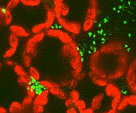Plant Pathology, Department of

Department of Plant Pathology: Faculty Publications
Document Type
Article
Date of this Version
6-1-1998
Abstract
A construct containing a human lactoferrin cDNA was used to transform tobacco (Nicotiana tabacum) using an Agrobacterium-mediated DNA-transfer system to express this human protein in transgenic plants. Transformants were analyzed by Southern, Northern, and Western blots to determine integration of the cDNA into the plant genome and lactoferrin gene expression levels. Most transgenic plants demonstrated significant delays of bacterial wilt symptoms when inoculated with the bacterial pathogen Ralstonia solanacearum. Quantification of the expressed lactoferrin protein by enzyme-linked immunosorbent assay in transgenic plants indicated a significant positive relationship between lactoferrin gene expression levels and levels of disease resistance. Incorporation of the lactoferrin gene into crop plants may enhance resistance to other phytopathogenic bacteria as well.


Comments
Published in PHYTOPATHOLOGY, Vol. 88, No. 7, 1998. Copyright © 1998 The American Phytopathological Society. Used by permission.